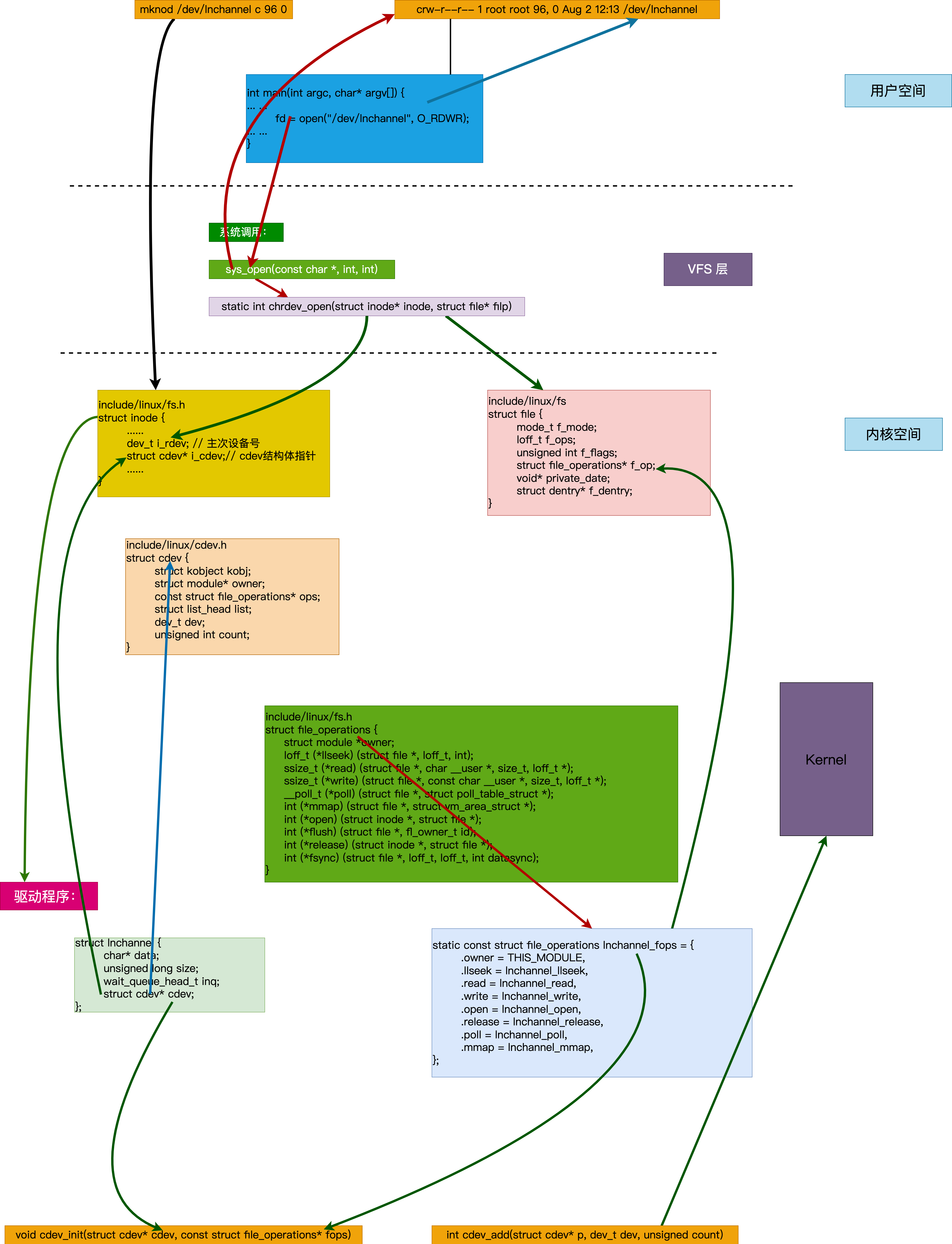架构图

代码分析
c
loff_t lnchannel_llseek(struct file *filp, loff_t offset, int whence) {
loff_t newpos;
switch(whence) {
case 0:
newpos = offset;
break;
case 1:
newpos = filp->f_pos + offset;
break;
case 2:
return -EINVAL;
}
if (newpos < 0 || newpos > LNCHANNEL_SIZE) {
return -EINVAL;
}
filp->f_pos = newpos;
return newpos;
}这段代码是一个文件操作函数
lnchannel_llseek(),它用于在文件中进行定位。具体来说,根据参数whenc e的值不同,函数将会根据指定的偏移量进行定位,并返回新的位置。
- 如果
whence为0,则将偏移量直接作为新位置。 - 如果
whence为1,则将当前位置(filp->f_pos)与偏移量相加得到新位置。 - 如果
whence为2,则返回无效参数错误(EINVAL)。
在完成计算新位置之后,函数会对新位置进行合法性检查。如果新位置小于0或大于预定义的文件大小(LNCHANNEL_SIZE),则会返回无效参数错误。
最后,函数更新文件结构体中的当前位置(filp->f_pos)为新位置,并返回新位置值。
c
unsigned int lnchannel_poll(struct file *filp, struct poll_table_struct *wait) {
struct lnchannel* channel = filp->private_data;
unsigned int mask = 0;
poll_wait(filp, &channel->inq, wait);
if (have_data) {
mask |= (POLLIN | POLLRDNORM);
}
return mask;
}这段代码是一个文件操作函数
lnchannel_poll(),用于进行文件的轮询操作。它主要用于检查是否有数据可读,并返回相应的事件掩码。
首先,函数从文件结构体中获取通道指针channel。
接下来,使用poll_wait()函数将当前进程加入到等待队列中,以便在有新数据到达时唤醒进程。
然后,在判断是否有数据可读之前,代码中缺少了一个变量have_data的定义和赋值过程。在此处假设该变量为布尔类型,并且已经被正确初始化。
如果存在可读数据,则将事件掩码的对应位(POLLIN | POLLRDNORM)设置为1,表示可读事件发生。
最后,函数返回事件掩码mask给调用者,表示当前的文件状态。
需要注意的是,这只是代码片段,并没有提供完整的上下文环境。如果需要更详细的解释或有其他问题,请随时提问。
完整代码实现
c
#include <linux/module.h>
#include <linux/types.h>
#include <linux/fs.h>
#include <linux/errno.h>
#include <linux/mm.h>
#include <linux/sched.h>
#include <linux/init.h>
#include <linux/cdev.h>
#include <linux/io.h>
#include <linux/uaccess.h>
#include <linux/slab.h>
#include <linux/poll.h>
#ifndef LNCHANNEL_MAJOR
#define LNCHANNEL_MAJOR 96
#endif
#ifndef LNCHANNEL_NR_DEVS
#define LNCHANNEL_NR_DEVS 2
#endif
#ifndef LNCHANNEL_SIZE
#define LNCHANNEL_SIZE 4096
#endif
#define ENABLE_POLL 1
struct lnchannel {
char* data;
unsigned long size;
#if ENABLE_POLL
wait_queue_head_t inq;
#endif
};
static int channel_major = LNCHANNEL_MAJOR;
module_param(channel_major, int, S_IRUGO);
struct lnchannel* channel_devp;
struct cdev cdev;
char have_data = 0;
loff_t lnchannel_llseek(struct file *filp, loff_t offset, int whence) {
loff_t newpos;
switch(whence) {
case 0:
newpos = offset;
break;
case 1:
newpos = filp->f_pos + offset;
break;
case 2:
return -EINVAL;
}
if (newpos < 0 || newpos > LNCHANNEL_SIZE) {
return -EINVAL;
}
filp->f_pos = newpos;
return newpos;
}
ssize_t lnchannel_read(struct file *filp, char __user *buffer, size_t size, loff_t *ppos) {
int ret = 0;
unsigned long count = size;
unsigned long long p = *ppos;
struct lnchannel* channel = filp->private_data;
if (p >= LNCHANNEL_SIZE) {
return 0;
}
if (count > LNCHANNEL_SIZE - p) {
count = LNCHANNEL_SIZE - p;
}
while(!have_data) {
if (filp->f_flags & O_NONBLOCK) {
return -EAGAIN;
}
wait_event_interruptible(channel->inq, have_data);
}
if (copy_to_user(buffer, (void*)(channel->data + p), count)) {
ret = -EFAULT;
}
else {
ret = strlen(buffer);
channel->size -= ret;
printk(KERN_INFO "read %d btye(s) from %ld\n", ret, p);
}
have_data = 0;
return ret;
}
ssize_t lnchannel_write(struct file *filp, const char __user *buffer, size_t size, loff_t * ppos) {
int ret = 0;
unsigned long count = size;
unsigned long long p = *ppos;
struct lnchannel* channel = filp->private_data;
if (p >= LNCHANNEL_SIZE) {
return ret;
}
if (count >= LNCHANNEL_SIZE - p) {
count = LNCHANNEL_SIZE - p;
}
if (copy_from_user(channel->data + p, buffer, count)) {
return -EFAULT;
}
else {
*(channel->data + p + count) = '\0';
channel->size += count;
ret = count;
*ppos += count;
printk(KERN_INFO, "written %d btyes from %ld\n", count, p);
}
have_data = 1;
wake_up(channel->inq);
return ret;
}
int lnchannel_mmap(struct file *filp, struct vm_area_struct *vma) {
vma->vm_flags |= VM_IO;
vma->vm_flags |= (VM_DONTEXPAND | VM_DONTDUMP);
if (remap_pfn_range(vma, vma->vm_start, virt_to_phys(channel->data) >> PAGE_SHIFT,
vma->vm_end-vma->vm_start, vma->vm_page_prot)) {
return -EAGAIN;
}
return 0;
}
int lnchannel_open(struct inode *inode, struct file *filp) {
struct lnchannel* channel;
int num = MINOR(inode->i_cdev);
if (num >= LNCHANNEL_NR_DEVS) {
return -ENODEV;
}
channel = &channel_devp[num];
filp->private_data = channel;
return 0;
}
int lnchannel_release(struct inode *, struct file *) {
return 0;
}
unsigned int lnchannel_poll(struct file *filp, struct poll_table_struct *wait) {
struct lnchannel* channel = filp->private_data;
unsigned int mask = 0;
poll_wait(filp, &channel->inq, wait);
if (have_data) {
mask |= (POLLIN | POLLRDNORM);
}
return mask;
}
static const struct file_operations lnchannel_fops = {
.owner = THIS_MODULE,
.llseek = lnchannel_llseek,
.open = lnchannel_open,
.write = lnchannel_write,
.open = lnchannel_open,
.release = lnchannel_release,
.mmap = lnchannel_mmap,
.poll = lnchannel_poll,
};
static int lnchannel_init(void) {
int result;
int i;
dev_t devno = MKDEV(channel_major, 0);
if (channel_major) {
result = register_chrdev_region(devno, LNCHANNEL_NR_DEVS, "lnchannel");
}
else {
result = alloc_chrdev_region(&devno, 0, LNCHANNEL_NR_DEVS, "lnchannel");
channel_major = MAJOR(devno);
}
if (result < 0) return result;
cdev_init(&cdev, &lnchannel_fops);
cdev.owner = THIS_MODULE;
cdev_add(&cdev, MKDEV(channel_major, 0), LNCHANNEL_NR_DEVS);
channel_devp = kmalloc(LNCHANNEL_NR_DEVS * (struct lnchannel), GFP_KERNEL);
if (!channel_devp) {
result = -ENOMEM;
goto fail_malloc;
}
memset(channel_devp, 0, sizeof(struct lnchannel));
for(i = 0; i < LNCHANNEL_NR_DEVS; i++) {
channel_devp[i].size = LNCHANNEL_SIZE;
channel_devp[i].data = kmalloc(LNCHANNEL_SIZE, GFP_KERNEL);
memset(channel_devp[i].data, 0, LNCHANNEL_SIZE);
init_waitqueue_head(&(channel_devp[i].inq));
}
printk(KERN_INFO "linchannel_init");
return 0;
fail_malloc:
unregister_chrdev_region(devno, 1);
return result;
}
static void lnchannel_exit(void) {
printk(KERN_INFO "lnchannel_exit");
cdev_del(&cdev);
kfree(channel_devp);
unregister_chrdev_region(MKDEV(channel_major, 0), 2);
}
MODULE_AUTHOR("Lenn Louis");
MODULE_LICENSE("GPL");
module_init(lnchannel_init);
module_init(lnchannel_exit);
Makefile
#!/bin/bash
ccflags_y += -O2
ifneq ($(KERNELRELEASE),)
obj-m := lnchannel.o
else
KERNELDIR ?= /lib/modules/$(shell uname -r)/build
PWD := $(shell pwd)
default:
$(MAKE) -C $(KERNELDIR) M=$(PWD) modules
endif
clean:
rm -rf *.o *.ko *.mod.c
depend .depend dep:
$(CC) -M *.c > .depend